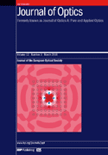
Journal of Optics
metrics 2024
Shaping Tomorrow’s Innovations in Optics
Introduction
The Journal of Optics, published by IOP Publishing Ltd, stands as a pivotal platform for disseminating cutting-edge research in the fields of atomic, molecular physics, and optics as well as electronic, optical, and magnetic materials. With an impact factor reflective of its esteemed position—ranking in the 60th percentile in both relevant Scopus categories—this journal, boasting an ISSN of 2040-8978 and an E-ISSN of 2040-8986, is uniquely positioned to foster innovation and collaboration among researchers, professionals, and students worldwide. Located in the United Kingdom and operational since 2010, the journal embraces an open access model, promoting maximal reach and engagement with the latest discoveries that shape the future of optics. As it continues to evolve through its converged years up to 2024, the Journal of Optics remains a critical resource for those seeking to advance their knowledge and influence in this dynamic field.
Metrics 2024
 0.57
0.57 2.00
2.00 2.00
2.00 110
110Metrics History
Rank 2024
Scopus
IF (Web Of Science)
JCI (Web Of Science)
Quartile History
Similar Journals

Chinese Optics Letters
Exploring the intersection of light and technology.Chinese Optics Letters is a prestigious academic journal published by Chinese Laser Press, dedicated to advancing the fields of atomic and molecular physics, optics, as well as electrical and electronic engineering. Since its inception in 2003, this journal has become a significant platform for researchers and professionals to disseminate innovative findings and foster collaboration within these rapidly evolving disciplines. With a commendable Q2 ranking in leading categories including Atomic and Molecular Physics and Electronic, Optical and Magnetic Materials, it ranks favorably within the Scopus database, with notable positions in both engineering and materials science sectors. The journal is headquartered in Shanghai, China, and while additional open access options are not specified, it remains a vital resource for those committed to pushing the frontiers of optical research and applications. As we approach 2024, Chinese Optics Letters continues to play an essential role in shaping scholarly discourse and technological advancement in optics.
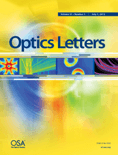
OPTICS LETTERS
Illuminating the Future of Optical ResearchOPTICS LETTERS is a premier academic journal published by the Optica Publishing Group, dedicated to advancing the field of optics and photonics. Since its inception in 1977, it has maintained a strong reputation for publishing high-impact research, holding a distinguished Q1 category ranking in Atomic and Molecular Physics, as well as Optics, making it a vital resource for researchers and professionals alike. With an impressive Scopus rank of #55 out of 224 in its field, OPTICS LETTERS continues to shape the discourse and innovation in optical science. Authors benefit from its extensive international reach, while readers gain access to cutting-edge studies that address both theoretical and applied aspects of optics. Although the journal currently does not offer open access options, its rigorous peer-review standards ensure that every publication meets the highest academic criteria, making it an essential journal for anyone looking to stay at the forefront of optical research.
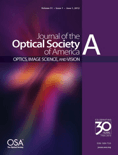
JOURNAL OF THE OPTICAL SOCIETY OF AMERICA A-OPTICS IMAGE SCIENCE AND VISION
Transforming Ideas into Optical InsightsJOURNAL OF THE OPTICAL SOCIETY OF AMERICA A-OPTICS IMAGE SCIENCE AND VISION, published by Optica Publishing Group, is a leading journal in the fields of optics, image science, and vision. With a rich history dating back to 1979, it serves as an essential platform for disseminating cutting-edge research and developments from 1984 to 2024. The journal covers a wide array of topics, including atomic and molecular physics, electronic and optical materials, and pattern recognition in computer vision. Its prestigious categorization in the Q2 quartile for Atomic and Molecular Physics and Optics and its Q3 rankings in Computer Vision and Medical fields indicate the high-level contributions it fosters within the scientific community. Researchers will benefit from its commitment to rigorous peer review and its role in advancing knowledge at the intersection of science and application. Although it is not an open-access journal, the quality of content attainable here is invaluable for academics, industry professionals, and students eager to explore the forefront of optical science.
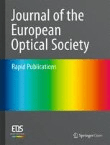
Journal of the European Optical Society-Rapid Publications
Showcasing Timely Innovations in OpticsJournal of the European Optical Society-Rapid Publications, with ISSN 1990-2573 and published by EDP Sciences S A, is a premier open access journal dedicated to advancing the field of optics and photonics since its inception in 2006. Based in France, this journal serves as a vibrant platform for researchers, professionals, and students to disseminate their findings quickly and efficiently. Achieving a commendable Q3 ranking in Atomic and Molecular Physics and Optics (2023), it reflects a growing impact within the scientific community, despite currently holding a 33rd percentile rank among similar publications in the realm of Physics and Astronomy. The journal fosters an environment of rapid communication and collaboration, making it an invaluable resource for those interested in the latest developments and innovations in optical sciences. With open access ensuring broad visibility for all published work, the Journal of the European Optical Society-Rapid Publications is positioned as a key contributor to enhancing the understanding and application of optical technologies.
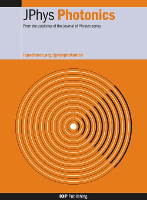
Journal of Physics-Photonics
Empowering Discoveries through Open AccessJournal of Physics-Photonics, published by IOP Publishing Ltd in the United Kingdom, is an esteemed Open Access journal that has been at the forefront of research in the field of photonics since its inception in 2018. With an impressive portfolio, the journal has achieved Q1 ranking in 2023 across multiple disciplines, including Atomic and Molecular Physics, Electrical and Electronic Engineering, and Electronic, Optical, and Magnetic Materials. This positions it among the leading journals in these areas, reflecting its significant influence and contribution to advancing knowledge and innovation. The journal aims to disseminate high-quality research findings that encompass a wide range of topics in photonics, promoting interdisciplinary approach that fosters collaboration among researchers, professionals, and students. With its commitment to open access, Journal of Physics-Photonics ensures that groundbreaking research is accessible to all, empowering a global audience to engage with and benefit from the latest advancements in photonic technologies.

Photonics
Empowering Researchers in the Realm of PhotonicsPhotonics, an esteemed journal published by MDPI, is a leading platform for researchers in the fields of atomic and molecular physics, optics, and instrumentation. Since its inception in 2014, the journal has fostered open access to cutting-edge research, facilitating knowledge dissemination in these dynamic disciplines. With its Q2 ranking in the 2023 Scopus metrics for various categories, including radiology, nuclear medicine, and imaging, Photonics represents a crucial academic resource for professionals and students seeking to advance their understanding and expertise. Located in Basel, Switzerland, the journal plays a pivotal role in bridging theoretical and practical approaches to photonic technologies. Researchers are encouraged to contribute their findings, thereby enriching the journal’s impact and relevance in the global scientific community through collaboration and innovation.
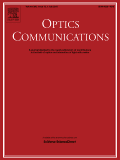
OPTICS COMMUNICATIONS
Illuminating the Future of Optical ResearchOptics Communications, published by Elsevier, is a prestigious international journal that focuses on the dynamically evolving fields of optics and photonics. With its ISSN 0030-4018 and E-ISSN 1873-0310, this journal has made significant contributions to the fields of Atomic and Molecular Physics, Electrical and Electronic Engineering, Electronic, Optical and Magnetic Materials, and Physical and Theoretical Chemistry, consistently ranking in the Q2 quartile across these categories for 2023. The journal, based in the Netherlands, is recognized for its rigorous peer-review process and aims to publish high-quality research articles that advance knowledge and applications in optical communication technologies. Although it operates under a subscription model, the insightful research published here plays an essential role in informing the work of researchers, professionals, and students alike. With a history dating back to 1969 and spanning well into 2025, Optics Communications remains a crucial resource for cutting-edge developments in optics, catering to a global audience dedicated to innovation in this pivotal science.

OPTICAL AND QUANTUM ELECTRONICS
Exploring the Nexus of Physics and EngineeringOPTICAL AND QUANTUM ELECTRONICS, published by SPRINGER, is a premier journal dedicated to advancing the fields of atomic and molecular physics, optics, and electronic engineering. With an ISSN of 0306-8919 and an E-ISSN of 1572-817X, this journal has established itself as a vital resource for researchers, professionals, and students alike, contributing to the discourse from its inception in 1969 to its continued publications through 2024. It holds impressive rankings in Scopus, placing within the top percentiles for its categories, specifically in the 64th for Electrical and Electronic Engineering and 63rd for Atomic and Molecular Physics. Though it does not currently offer open access options, the journal's robust impact factor reflects its importance within its field, making it an essential reference point for cutting-edge research and developments in materials science and optics. Through its rigorous peer-review process, OPTICAL AND QUANTUM ELECTRONICS remains committed to publishing high-quality, influential studies that push the boundaries of innovation and understanding in these dynamic areas of science.
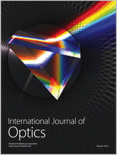
International Journal of Optics
Transforming Perspectives Through Optical ResearchWelcome to the International Journal of Optics, a distinguished publication dedicated to advancing the field of optics and its interdisciplinary applications. Published by HINDAWI LTD, this open-access journal has been pivotal in fostering knowledge since its inception in 2009. With a robust focus on atomic and molecular physics as well as electronic, optical, and magnetic materials, the journal has carved its niche within Q3 quartile rankings in these categories for 2023, signifying its growing impact and relevance in the scientific community. Researchers and professionals will find a rich repository of innovative and cutting-edge research articles that not only address fundamental aspects of optics but also explore practical applications across various domains. The journal's aim is to promote high-quality research dissemination, enhancing collaboration among scientists and ensuring that pivotal findings reach a global audience. Join us in exploring the dynamic world of optics—where your contributions help shape the future of science.

APPLIED OPTICS
Exploring Innovations in Applied OpticsApplied Optics, published by Optica Publishing Group, is a prestigious journal dedicated to the field of optics and photonics. With an ISSN of 1559-128X and an E-ISSN of 2155-3165, this journal serves as a critical platform for researchers, professionals, and students eager to disseminate innovative findings and advancements in applied optics. Established in 1962, it has maintained a significant presence in the academic community, currently holding a Q2 category ranking in various disciplines including Atomic and Molecular Physics, Electrical and Electronic Engineering, and Miscellaneous Engineering as per the 2023 metrics. The journal's reputation is underscored by its solid Scopus rankings, attesting to its influential research output. While not an open-access journal, it continues to offer vital insights and discussions on the latest research topics that are critical to the advancement of technologies in optics, ensuring accessibility to vital knowledge for those within the field.